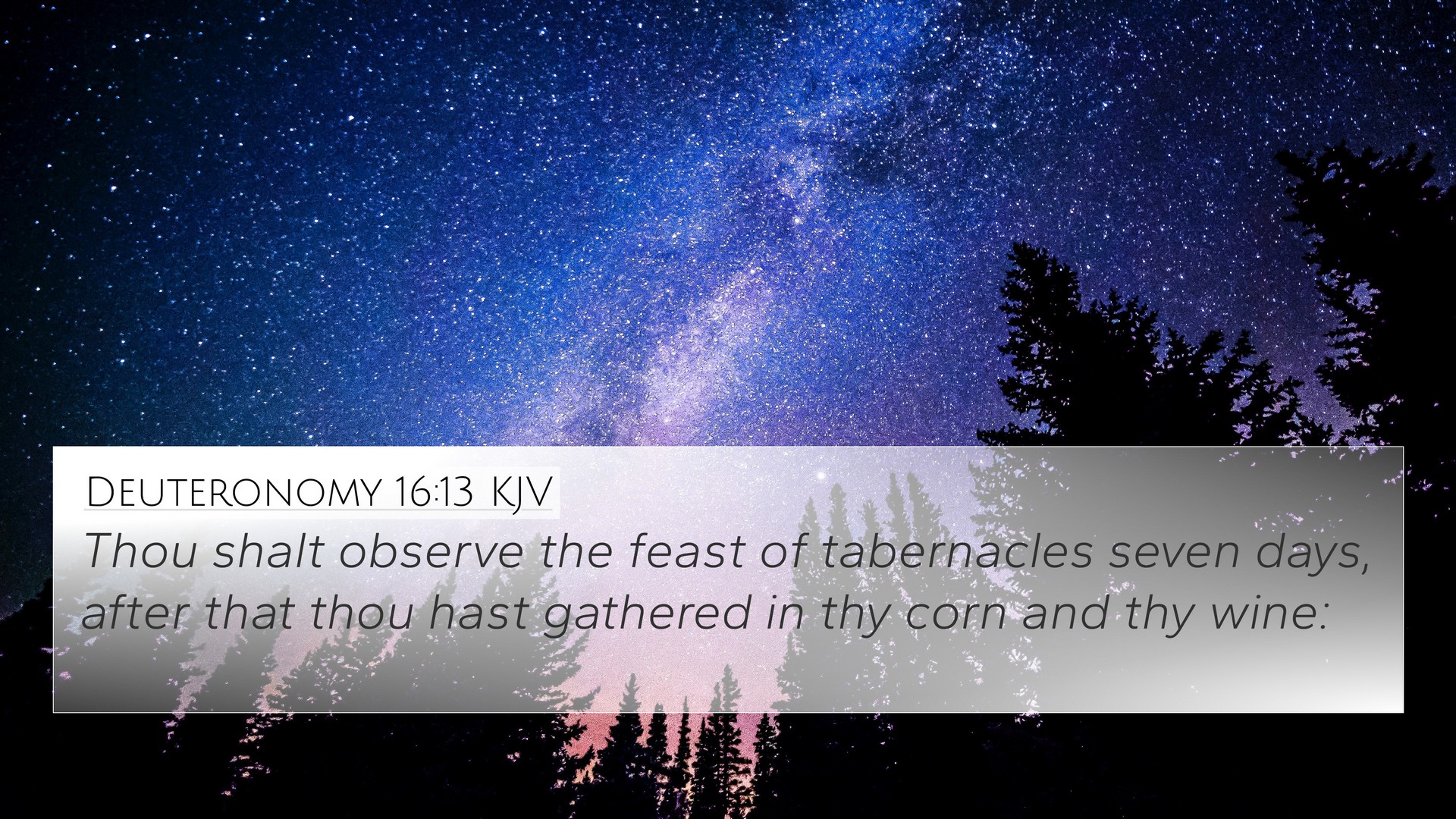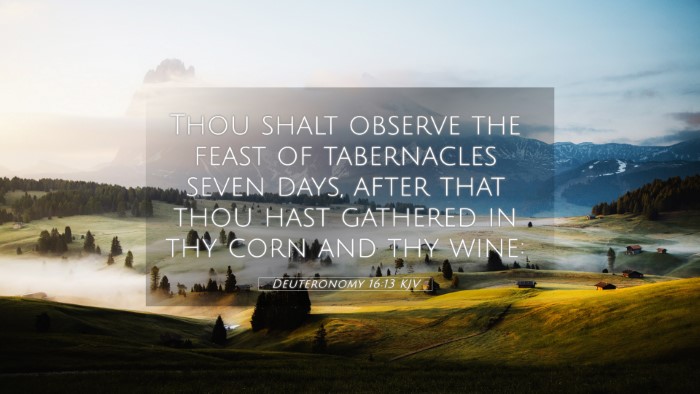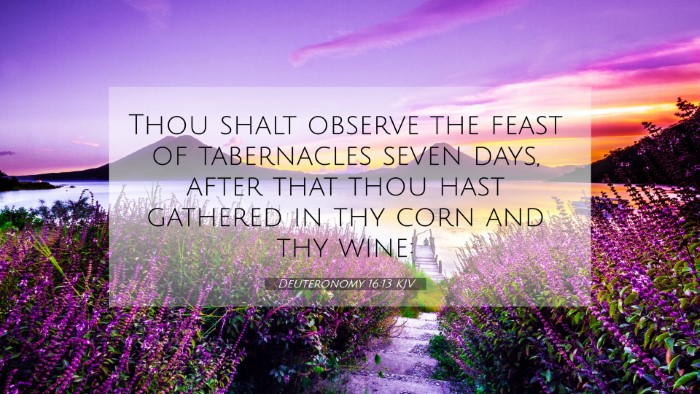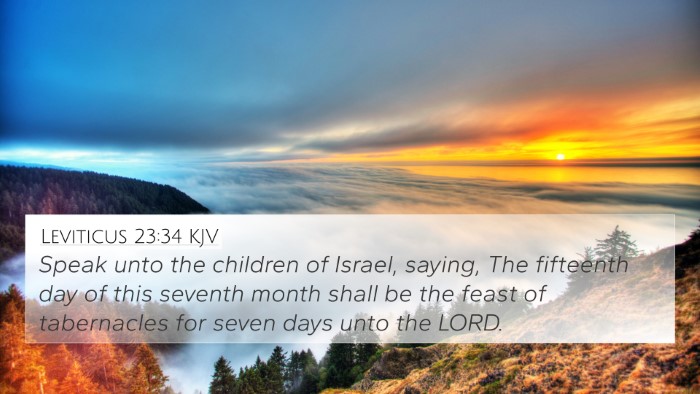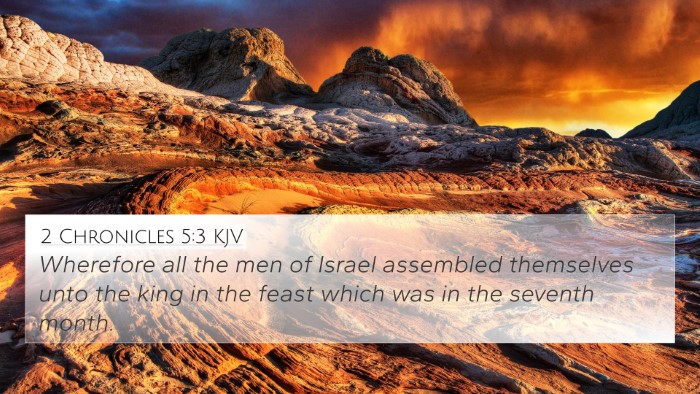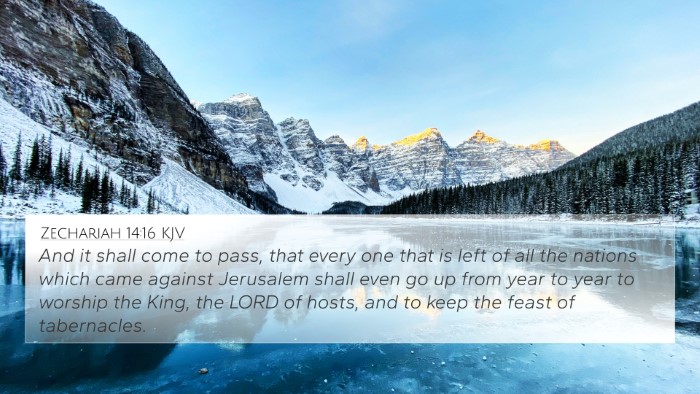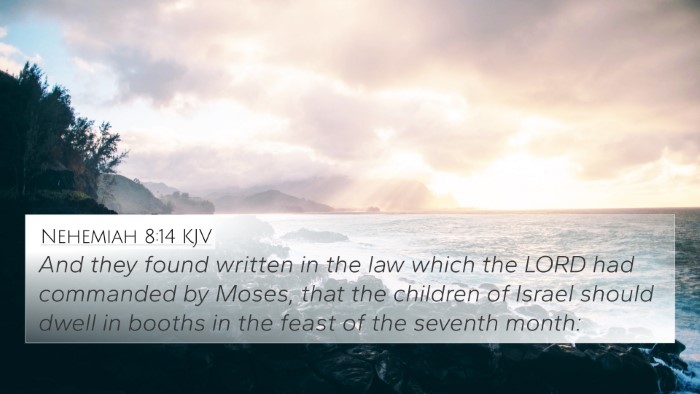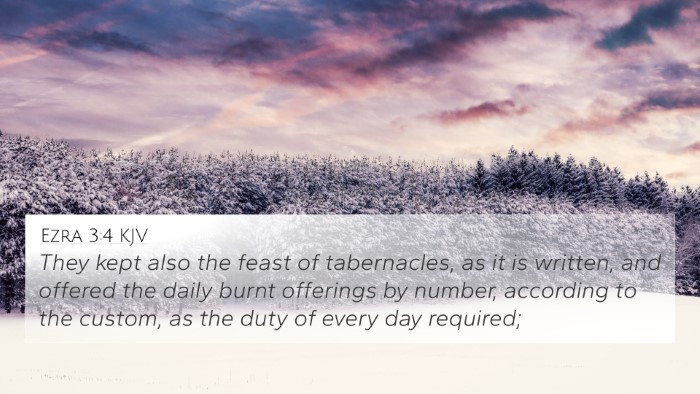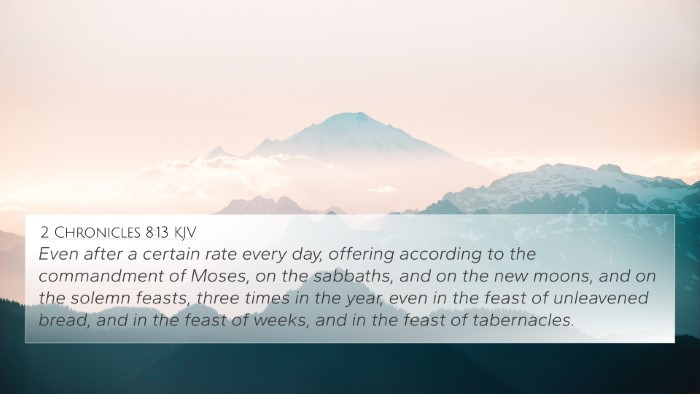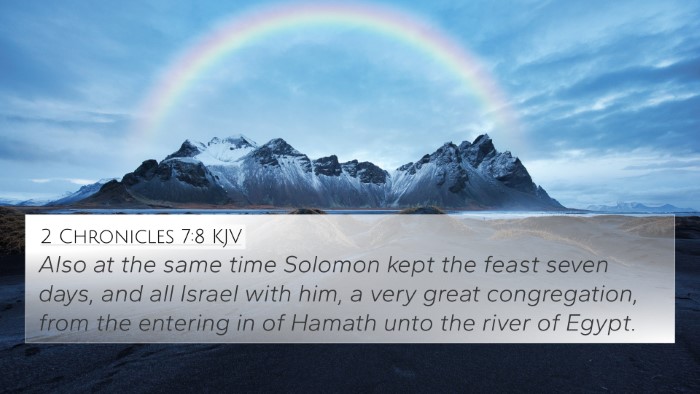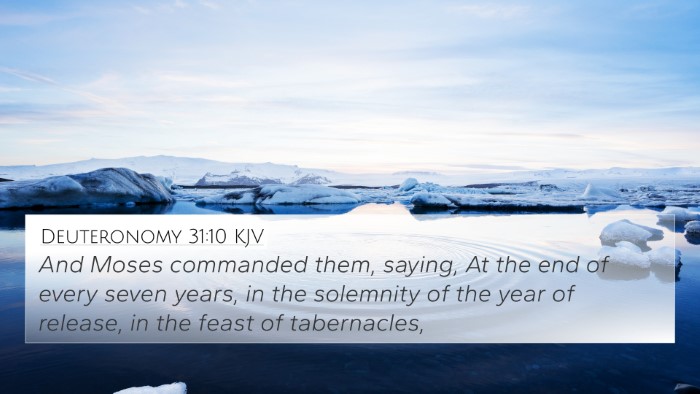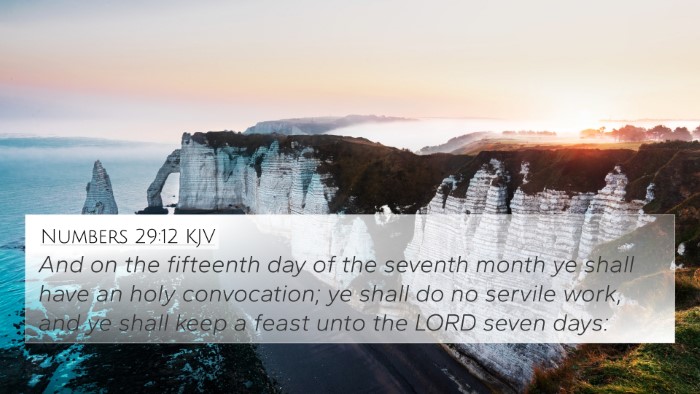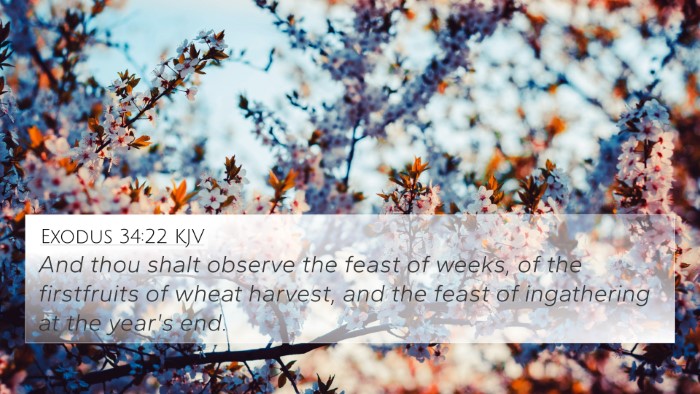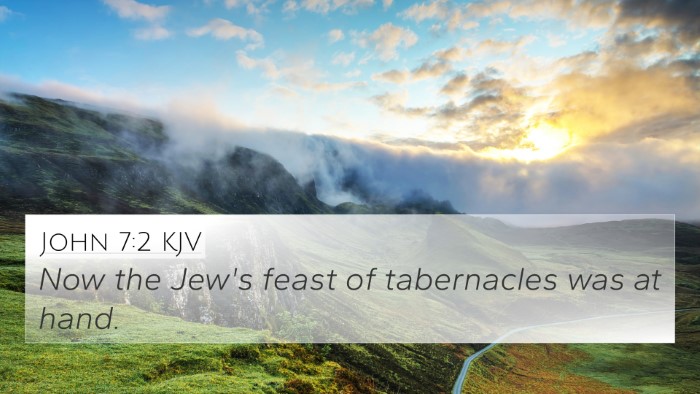Understanding Deuteronomy 16:13
Verse Reference: Deuteronomy 16:13 - "You shall keep the Feast of Tabernacles seven days, after that you have gathered in your corn and your wine."
Summary of Meaning
Deuteronomy 16:13 outlines the command for the Israelites to observe the Feast of Tabernacles, or Sukkot, a celebration that occurs after the harvest. This feast serves as a reminder of God's provision in the wilderness and presents an opportunity for gratitude and communal joy. The biblical significance of the feast integrates themes of thankfulness, remembrance, and an acknowledgment of God's faithfulness.
Insights from Public Domain Commentaries
Matthew Henry: Henry emphasizes the importance of observational feasts, noting that such gatherings are meant to inspire reflection on the past as well as foster community. The Feast of Tabernacles specifically is a time for rejoicing in the plentiful harvest God has provided. He points out that this act of remembrance serves to keep the Israelites grounded in their identity as God's chosen people.
Albert Barnes: Barnes describes the practical aspects of the celebration, focusing on the gathering of produce as a catalyst for gratitude. He points out that the command to rejoice reflects God's desire for His people to acknowledge His blessings in a joyful and communal manner. This festive gathering not only honors God but also reinforces the importance of community in worship and remembrance.
Adam Clarke: Clarke provides insights into the traditional practices associated with the feast, highlighting the significance of living in temporary shelters (booths) as a symbol of dependence on God. He interprets the seven days of celebration as indicative of completeness, paralleling the rest of God on the seventh day of creation, thereby linking the concept of divine rest with the joyful remembrance of God's provision.
Biblical Context and Themes
This verse is set within the context of Deuteronomy 16, which details various festivals and holy days. The overarching theme is God's desire for His people to commemorate their history, acknowledge His provision, and foster communal unity through worship.
Cross References
- Leviticus 23:34: "Speak to the children of Israel, saying: 'The fifteenth day of this seventh month shall be the Feast of Tabernacles for seven days to the Lord.'" - Reinforces the timing and observance of the Feast of Tabernacles.
- Exodus 23:16: "And the Feast of Harvest, the firstfruits of your labors which you have sown in the field; and the Feast of Ingathering at the end of the year, when you have gathered in the fruit of your labors from the field." - Connects the harvest theme to gatherings and celebrations.
- Leviticus 23:42: "You shall dwell in booths for seven days. All who are native Israelites shall dwell in booths." - Clarifies the symbolism of the booths in the celebration.
- John 7:2: "Now the Jews’ Feast of Tabernacles was at hand." - Highlights the significance of the feast well into the New Testament.
- Psalm 118:15: "The voice of rejoicing and salvation is in the tents of the righteous; the right hand of the Lord does valiantly." - Sings the joy and celebration associated with God’s deeds.
- Zechariah 14:16: "And it shall come to pass that everyone who is left of all the nations which came against Jerusalem shall go up from year to year to worship the King, the Lord of hosts, and to keep the Feast of Tabernacles." - Shows the prophetic significance of the feast.
- 1 Corinthians 5:8: "Therefore let us keep the feast, not with old leaven, nor with the leaven of malice and wickedness, but with the unleavened bread of sincerity and truth." - A New Testament link that ties feasting to purity and sincerity in worship.
- Acts 18:21: "But took leave of them, saying, 'I must by all means keep this coming feast in Jerusalem; but I will return again to you, God willing.' And he sailed from Ephesus." - Illustrates the continuity of the feast's importance in Christian practice.
- Revelation 21:3: "And I heard a loud voice from the throne saying, 'Behold, the dwelling place of God is with man. He will dwell with them, and they will be his people, and God himself will be with them as their God.'" - Points towards ultimate fulfillment and the joyful gathering of God's people.
Thematic Connections
The Feast of Tabernacles symbolizes joy, unity, and dependence on God. It shows how the Old Testament practices resonate in the New Testament teachings, as they both encompass the celebration of God's provision and faithfulness.
Cross-Referencing Biblical Texts
The act of cross-referencing verses indicates the interwoven nature of biblical narratives, where themes recur and deepen our understanding of God's promises through different eras. Such an analysis, for example, showcases how the celebration of one feast relates to God's overarching plan of salvation and grace.
Tools for Bible Cross-Referencing
To enhance biblical study, one can utilize:
- Bible Concordance: A tool that helps locate verses based on keywords.
- Bible Cross-Reference Guide: Systems that link related scriptures for deeper study.
- Cross-Reference Bible Study Methods: Techniques to discover thematic and narrative connections.
Conclusion
Deuteronomy 16:13 is more than a directive; it invites believers into a rhythm of gratitude and celebration, reflecting upon God's goodness and provision. Through interconnections with other scriptures, the verse enriches our understanding of faith, community, and worship in both historical and contemporary contexts.
